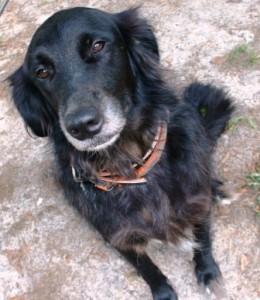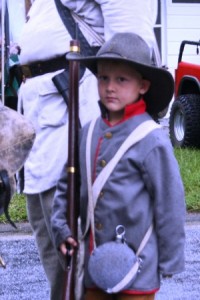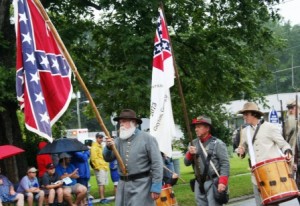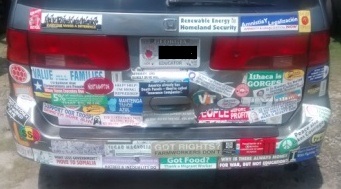When I was a child my father never let us put bumper stickers on our cars. So my very first “bumper sticker” was actually a parking permit. This fall, I put the first real bumper sticker on my car, “I’m Ready Hillary.” Let me explain why I put it on and also why, ultimately, I took it off.
I did not think deeply about bumper stickers as an expression of identity until I moved to a small town in the deep south. I had preconceived notions about the conservative political and social climate here. Without generalizing, some of these —at least from my vantage point—were true, expressed not only though state level policies but within the public institutions of education, newspapers, and yes, bumper stickers.
I put a bumper sticker on my car to proclaim my liberal identity, not in reaction to a generally conservative environment but in response to an accumulation of events. The last straw, so to speak, was when my neighbor, with expletives, yelled “Yankee move back North!” (Read the full story here.) Why you might ask did our “preacher” neighbor scream this at us? He was upset by our dog, Bean, who would jump by the fence incidentally scaring his grandchildren.

This is Bean (left), a black lab and golden retriever mix, who can be obnoxious, but not vicious.
Had our neighbor just asked us to keep our dog away from the fence, we would have taken care of the issue. But after such a hostile interaction with our neighbor (while in the presence of my spouse who had been holding our four-year-old son at the time), I was angry and scared.
We were already outsiders to a small community. I am affiliated with the university in town and we were (are) “liberal Yankees from the North.” Confederate Pride is still strong in many places. If you Google “Yankee transplants to the South” you’ll see message boards and groups talking about us northerners. Many places here regularly feature “Sons of the Confederacy” flags and similar promotions. I took the photos below at a local parade a few weeks after I arrived in town.

(Photo by Author)

Four days after “the altercation,” my spouse and I were both working from home when Animal Control arrived. During a conversation in our backyard (which could truly be another story in itself), the employee told us that our neighbor did not call animal control to complain but went in person the day after the incident, screaming about us “Damn Yankees” and our dog. We had already taken care to keep Bean away from the fence but were reprimanded just the same.

(Photo courtesy of the author)
By this time I had already been asked over several months to attend a certain denomination of church that I do not believe in. This was the case even after I started going to a church of my choice, one that does fit with my social justice values. I also felt like my children, through everyday interactions and the public schools, were being indoctrinated into beliefs that were contrary to those of our family. (There is more to this story too, as the ACLU became involved in a religious controversy in the public schools).

(Photo courtesy of author)
I’d had enough. The incident with the neighbor was the tip of the iceberg. Just then, I received an email about getting a free “I’m Ready for Hilary” bumper-sticker. As soon as it came in the mail, I immediately slapped it on my bumper. My car is already noticeable, with dents and duct tape displayed proudly. I was not going to be afraid. I wanted my bumper sticker to say, “I am a liberal and I live here too.” I wanted people to know my identity. And I knew it was noticeable, as folks I know told me they knew my car by its bumper sticker. (Read more about this in my blog.)
I liked being honest and open about my liberal and social justice identity. I even thought about having a contest and asking friends across the country to send me all the liberal, social justice focused bumper stickers they could find so I could truly decorate my car. Full expression! But then I started to question having this bumper sticker both in terms of safety issues and well, as my partner asked, if people even knew who Hilary was. Thus, I wrote at the time:
But the other part of me wonders, and a lot of this stems from teaching sociology and criminology/criminal justice courses and students and their biases, will I get pulled over just because of my sticker? Will someone try to hurt my children because I have this bumper sticker? Or maybe as a few friends have asked me, do people here even know what this means?
I eventually took the sticker off. Why is is a hard question for me to answer, as a feminist, as a social justice advocate, a mother, and a spouse.
When I see injustice or inequality, I have a hard time not speaking up about them. I thank my parents for lessons on this as a child, and my sociology, women’s studies, and social work training. I would never say I am oppressed in the South—I am a middle class, cis-gender, white woman who is highly educated. But the politics are hard for me, as I am a liberal, pro-choice, LGBTQ ally, pro-immigrant rights, racial justice ally, supporter of welfare rights, and among other things believe in paying more taxes to help the common good. And I live in a small town where I am an outsider, not only because I am a “Northerner” who speaks differently and has different views on politics, but because I am not “from here.” I’m not oppressed, but there are times I feel like I don’t fit in.
While all these social justice issues are core to my work as a sociologist, activist, how I raise my children, and my own identity, I’ve come to a decision that I must engage in “Quiet Activism.” While some may say I should be speaking up more, I’ve decided that I do not want to display my identity through a bumper sticker. I’ve decided that my activism has to be “quiet,” and I must find ways to make a difference without sacrificing the safety of my family or my career.
I do not dislike the South. There are many things to like. But I stand strong by my social justice ideals that do not always match the visible environment here. There are many folks standing strong for social justice here. With permission from a colleague, there are those who are not covert about their identities.

In a small town people know your car. You learn quickly through small social networks the political and religious leanings of your children’s teachers and classmate’s families. And many times they are not the same as ours. And when you live in a state with “guns everywhere” laws and you find out that parents can have guns in their cars in the drop-off line at school, it is rational to question your difference and your safety. You learn that as a Northerner you can be seen as suspect as you are trying to change the social and political climate. There are other ways, through something as small as conversations with my children about our beliefs compared to what they hear, what and how I teach my courses, and mentoring my students who believe in social justice causes and have experienced oppression. Each day I live here, which is starting to feel less like a foreign country, I know my sociological imagination is stretching. In doing so, I am learning ways to make a difference without putting my kids, family, or career at risk.
For myself, as a dear friend told me, you have to learn to do the dance, which I am learning as a newcomer and Northerner. As I learn to do this dance, I reflect on my identity, outsider status, social justice, and how to teach my kids about diversity, oppression, and tolerance, I enjoy the long lasting warm weather in the South and creating my own oasis.



Comments 3
Adrienne Cohen — September 25, 2014
"Be the change you want to see in the world" -Gandhi
Gayle Sulik — September 30, 2014
“I did not design this game; I did not name the stakes. I just happen to like apples; and I am not afraid of snakes.” -- Ani Difranco
Bryana S — October 1, 2014
Hi there, This was great, i happen to live in the south and people are like that, but i believe that applies everywhere. And as a teenage girl in todays society i also feel like its very crucial for more people to understand that we all have our own opinions, beliefs, etc, and even if theyre not the same as yours they should be accepted and you should not be hated for it or treated differently. Most people, or in my experience, say they "respect and understand" others opinions when they really dont. I myself was somewhat a person like that until very recently, when someone i looked up to very much did a horrible thing. This caused arguments between me and my friends, they "respected" my view on it and as did i, even though i didnt. Without going into much detail, we all tried to see each others point, well i mean i did, and i see where they were coming from. Did that change my view on it? Not really. Could it have? Maybe. Point is, if someone who is young you could say can see and realise this, then why cant older people with more experience in life? a mystery to all of us. Anyways, i really enjoyed reading this,it was Amazing! Keep up the good vibes -Bryana